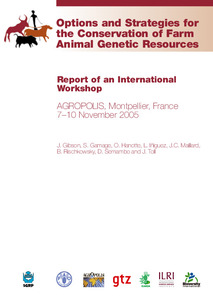Options and strategies for the conservation of farm animal genetic resources: Report of an international workshop, AGROPOLIS, Montpellier, France, 7-10 November 2005
Farm animals play a crucial part in the livelihood systems and well-being of the poor in the developing world, and thereby in helping to meet the Millennium Development Goals. In addition to food, clothing and other goods, livestock are important for income generation, wealth accumulation, traction and nutrient cycling. Of particular significance is the contribution they make to the livelihoods and wellbeing of smallholders in marginal environments, especially women and children. The diversity of cattle, sheep, goat, pig, poultry and breeds of other farm animal species represents an irreplaceable source of traits for livestock development in response to changing environmental and human needs. However, these genetic resources are being eroded as a result of changing agricultural practices and economic, environmental and other factors. Of particular concern are the high rates of loss of indigenous breeds in developing countries, which, coupled with inadequate programmes for the use and management of the genetic resources, is negatively impacting on livelihood options for the poor. The need to reduce the degradation of farm animal genetic resources and establish programmes for their conservation and sustainable use is well recognized. It is embodied in the objectives of the Convention on Biological Diversity and in the development of the Global Strategy for the Management of Farm Animal Genetic Resources, led by the Food and Agriculture Organization of the United Nations (FAO). Noting the need for a greater understanding of the status of farm animal genetic resources and the measures necessary for their conservation and sustainable use worldwide, in 1999 the FAO Commission on Genetic Resources for Food and Agriculture initiated a country-driven process to develop the first Report on the State of the World's Animal Genetic Resources. The Report will be finalized at the First International Technical Conference on Animal Genetic Resources in September 2007, hosted by the Government of Switzerland. With the aim of assisting the international community in developing a global framework for the conservation of farm animal genetic resources and identifying priorities for action, the System-wide Genetic Resources Programme (SGRP) of the Consultative Group on International Agricultural Research (CGIAR), in association with FAO, AGROPOLIS, France, and the Deutsche Gesellschaft für Technische Zusammenarbeit (GTZ) GmbH, Germany, convened an international workshop on Options and Strategies for the Conservation of Farm Animal Genetic Resources in November 2005, hosted by AGROPOLIS in Montpellier, France. The workshop brought together 63 experts from 28 countries and from the CGIAR centres, FAO, the French scientific community, including the Institut national de la recherche agronomique (INRA) and the Centre de coopération internationale en recherche agronomique pour le développement (CIRAD), and GTZ. The workshop findings are presented in this report.

